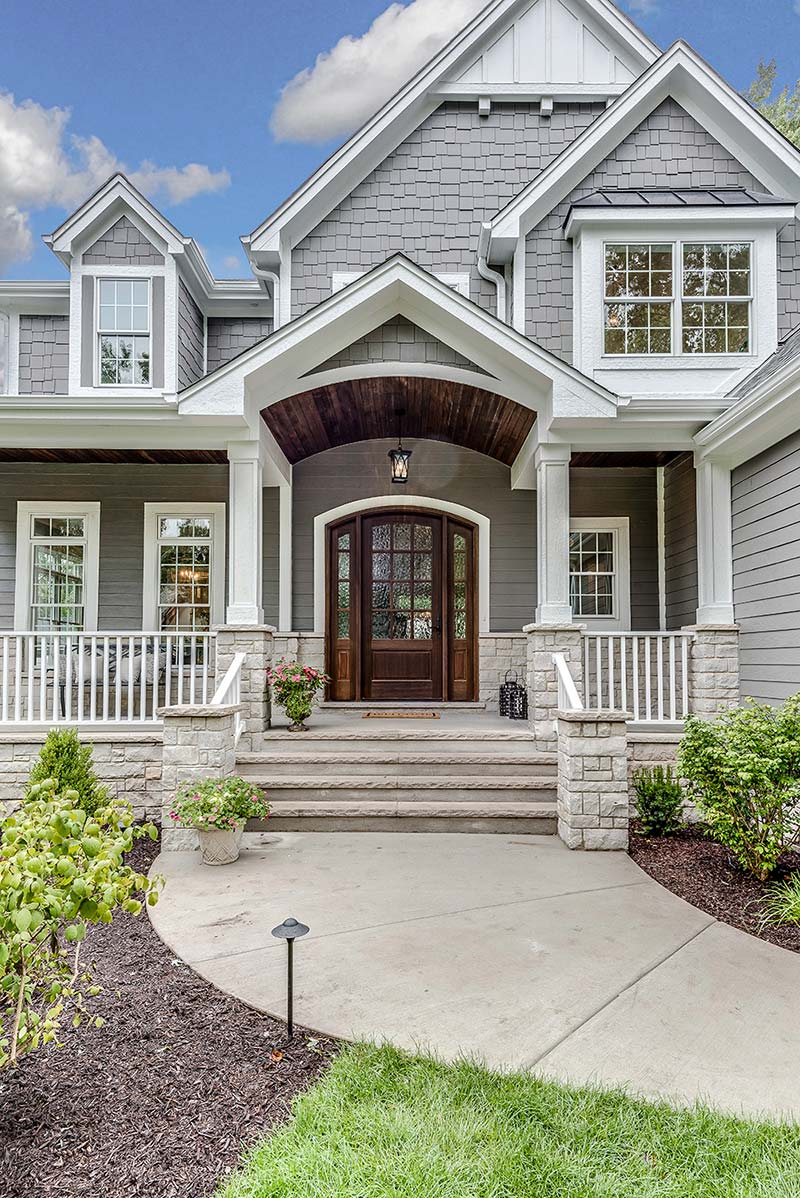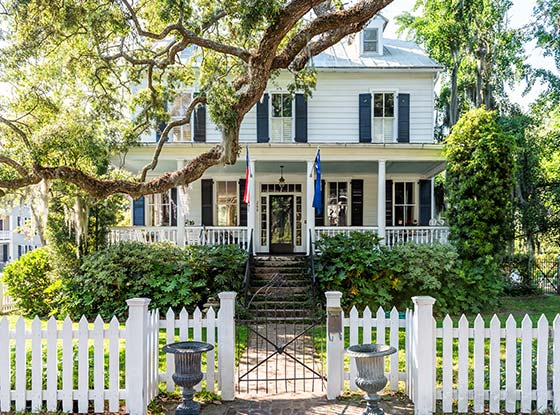Few purchases give you a sense of pride and accomplishment like buying a new home. From white picket fences and lush green grass to cookouts with neighbors and holidays with the family, owning a home is magical. Like most great things, though, enduring the home-buying process takes a lot of work. There are many steps to take and difficult decisions to make along the way. One of the most crucial decisions is what type of home loan and mortgage broker to choose. Whether it's your first time buying a home or you're a seasoned owner with multiple properties, you will need a trusted mortgage broker in Folly Beach, SC, with your best interests at heart.
If you're like most people, you need a mortgage professional whose top priority is their customers - an expert who can provide accurate advice and guidance so you can make educated decisions. That's where Mission One Mortgage comes into the picture.
DifferenceThe Mission One Mortgage Difference

Whether you want the best interest rates or don't know where to start in the home-buying process, Mission One Mortgage can set you up in the right direction. From getting you pre-qualified to buy a home to securing a veteran's loan, Mission One Mortgage is the trusted solution you need. As Folly Beach natives, we're proud to serve the Lowcountry and all of South Carolina with trusted mortgage brokerage services.
Unlike some mortgage companies in Folly Beach, SC, we bring years of high-level experience and insight to the table. Having worked with hundreds of clients during our time in business, we know you're probably going through a range of emotions right now. Buying a new home can be a scary process, especially for first-time buyers. That's why we make every effort to make ourselves accessible and available for clients. Our primary goal is to help you make the right mortgage for your family and your budget.
Our Services
- Mortgage Broker Folly Beach, SC
- The Mission One Mortgage Difference
- Why Should I Work with a Mortgage Broker in Folly Beach, SC
- Exploring the Benefits of Working with a Mortgage Broker
- Common Home Loan Options in South Carolina
- Home Mortgage FAQs
- Mission One Mortgage: Turning Dreams into Reality, One Mortgage at a Time
Service Areas
We know that many home loan officers have horrible reputations. Some brokers only see their clients as transactions, and a means to make quick money. They come off as impatient and pushy, failing to understand that this is a very big decision for you. At Mission One Mortgage, we take the opposite approach. We encourage our clients to take as much time as needed to ask us questions and review mortgage documents. We could say that our mission is to exceed your expectations, but we'd rather just show you. From assistance finding FHA, VA, or other loans to refinancing your current mortgage, Mission One is the team you can trust.
Here are just a few reasons why home buyers choose Mission One Mortgage:
Why Should I Work with a Mortgage Broker in Folly Beach, SC?

Most people simply don't have access to the hundreds of thousands of dollars needed to purchase a home with cash. Instead, they take out a mortgage loan to buy a home. Unfortunately, many homebuyers are anxious to get the ball rolling and, due to their excitement, fail to shop around for the best mortgage rates. To some degree, avoiding this step makes sense, as it requires a lot of legwork and research to get the job done. For those not wanting to spend hours researching a reasonable mortgage, there's an alternative to consider - working with a mortgage broker.

To understand the benefits of working with a mortgage broker, you must first understand their role in the home-buying process.
What Does a Mortgage Broker Do?
Your mortgage broker is a third party that works to connect you with mortgage lenders. Essentially, a mortgage broker works as an intermediary between a person who wants to buy a home and the entities offering loans to buy a home. The mortgage broker works with both the borrower and lender to get the borrower approved. They also verify and collect paperwork from the borrower that the lender needs to finish a home purchase. Typically, mortgage brokers have relationships with several home loan lenders. Mission One Mortgage, for example, has access to 50 different lenders, which gives us a wide range of home loans in Folly Beach, SC, from which to choose.
In addition to finding a home loan lender, your mortgage broker will help you settle on the best loan options and interest rates for your budget. Ideally, your mortgage broker will take a great deal of stress and legwork off your plate while also potentially saving you money.
Help with the Pre-Approval Process
If you're ready to buy a home, getting pre-qualified is a great choice that will streamline the entire process. Your mortgage broker makes getting pre-approved easy by obtaining all the documents needed to get you pre-qualified. In taking a look at your application, they will determine if you're ready for the pre-approval process. If your application needs additional items, the mortgage company will help point you in the right direction to ensure your application is as strong as it can be. Your mortgage broker will also walk you through the different types of loans, from Conventional and FHA to VA and USDA.
In order to be pre-approved for a home in South Carolina, you must have the following:
- Two Years of W2 Forms
- 30 Days of Pay Stubs from Employer
- 60 Days of Bank Statements
- A Valid Driver's License
BenefitsExploring the Benefits of Workingwith a Mortgage Broker

Most people choose to use a mortgage broker because they have access to different lenders and interest rates. But a great mortgage broker brings more to the table than a choice of lenders.
Save You from Unneeded Stress:One of the biggest advantages of hiring a mortgage broker is that they can find and vet loans while managing the mortgage process on your behalf. The best mortgage companies, like Mission One Mortgage, hire brokers who are experts at keeping underwriting on track, coordinating with relevant parties, and handling all paperwork involved. At the end of the day, mortgage brokers save you stress and time and often expedite the closing process.
More Access: We touched on this earlier, but it bears repeating: A mortgage broker provides access to a range of loans, rates, and lenders. In fact, many mortgage brokers can get rates lower than what the average person could get from a lender.
Save You Money: There's a chance that your mortgage broker can get your mortgage fees reduced or waived by the lender, which could save you a good deal of money.
Help with Unfavorable Financial Situations: Expert mortgage brokers can often assist in challenging financial situations, like when a buyer has inconsistent income or less-than-perfect credit. Experienced brokers, like those at Mission One Mortgage, are often aware of lenders willing to will work with nontraditional borrowers.
Provide Key Insights: Mortgage brokers share important insights, such as your chances for a home loan approval and exactly how much house you can afford. They can also save you from making costly mistakes based on their years of expertise in the mortgage industry.

Home LoanCommon Home Loan Options in South Carolina

While settling on the best type of home loan isn't as exciting as searching for the home of your dreams, it's equally important. Yes, your Mission One Mortgage loan officer in Folly Beach, SC, will be happy to help explain the differences between home loans. But understanding the basics ahead of time will save you stress and time in the long run.
Contact Us For Service !
Free Consultation (843) 822-5685
(843) 822-5685
Conventional Mortgages
Conventional loans can be used to purchase a new home or refinance your current one. Conventional loans include fixed-rate mortgages and adjustable-rate mortgages. Generally, borrowers must put down a 3% down payment for owner-occupants, 10% for a vacation property, and 20% for an investment home. If you are able to pay 20% of the total cost of the home, you can avoid private mortgage insurance, which is otherwise required. Conventional mortgages are often preferred by buyers with good credit or people needing a non-owner-occupied mortgage.


FHA Loans
FHA mortgages are issued by the U.S. government and backed by the Department of Housing & Urban Development (HUD). This loan is often preferred by first-time homebuyers because it only requires a 3.5% down payment and offers more flexibility with credit requirements and underwriting standards. FHA loans have several requirements you must meet to qualify. Contact Mission One Mortgage today to learn more about FHA loans and whether or not they're best for your financial situation.
USDA Loans
Also backed by the government, these loans are insured by the U.S. Department of Agriculture and don't require money down. These loans have lower insurance requirements when compared to FHA loans, offer 100% financing if you qualify, and allow for closing costs to be covered by the seller. In order to qualify for a USDA loan, you must live in a rural area, and your household income must meet certain standards. These loans are often preferred by low-income citizens who live in rural parts of South Carolina.


Veteran Mortgages
Also known as VA or Veteran's Affairs loans, these mortgages are reserved for the brave men and women who served in the military. VA loans help provide our military members, veterans, and their families with favorable loan terms and an easy home ownership experience. Often, those who qualify are not required to make a down payment on their home. Additionally, these loans often include less expensive closing costs.
If you are a veteran or the family member of a veteran, contact Mission One Mortgage today to speak with our Vetted VA Professional, Debbie Haberny. Debbie helps our military members, veterans, and their family members obtain home loans utilizing veteran benefits and would be happy to help as you search for a home.
FAQsHome Mortgage FAQs

Do you have questions about the complexities of mortgages and home loans? As your advocate, Mission One Mortgage is here to answer any questions you have about mortgages and the home-buying process. We encourage you to call our office to speak directly with one of our mortgage experts or continue reading below for answers to some frequently asked questions.
Q. I was talking to my spouse about mortgage brokers, and they mentioned the phrase home loan originator. What's the difference between a broker and a loan originator?
A. The mortgage industry is full of confusing jobs and titles, making it easy to confuse roles and responsibilities. Such is the case with mortgage brokers and home loan originators. Though their roles share similarities, a home loan originator in Folly Beach, SC, works for a bank or credit union, while a mortgage broker works for a brokerage company. Home loan originators and mortgage brokers are both licensed by the Nationwide Multistate Licensing System (NMLS).
Q. I've heard from everyone that you must have mortgage insurance to buy a home. What is mortgage insurance?
A. Essentially, mortgage insurance helps protect lenders if a borrower forecloses on the home they bought. One advantage of mortgage insurance is that when borrowers pay it, lenders can often grant loans to buyers when they might not have otherwise. Though not always required to buy a home, mortgage insurance is often needed for down payments of less than 20%.
Q. I have just been pre-approved to buy a beautiful home in South Carolina. Is there anything I shouldn't do now that I'm pre-qualified?
A. Mortgage companies like Mission One Mortgage, make getting pre-qualified for a home easy. However, as your loan process continues, your lender is required to run a new credit report before closing on a home. For that reason, it's to avoid any activity that might affect your credit score, such as:
- Do not become a co-signer on a loan with someone else.
- Do not quit or change your job.
- Do not apply for new credit cards, automobile loans, or any other lines of credit.
- Do not use your credit card to pay for large purchases, like furniture for your new house.
- Do not avoid payments on current lines of credit, loans, or utility bills.
Q. My brother-in-law recently refinanced his home in South Carolina. What is refinancing, and should I consider refinancing my home too?
A. Refinancing your home basically means you're swapping your current mortgage for a new one, most often with a lower interest rate. If you would like to reduce the term of your loan, lower your monthly mortgage payments, or consolidate debt, refinancing may be a smart option. Many homeowners also choose to refinance if they want to switch from adjustable-rate mortgages to fixed-rate mortgages or to get cash back for home renovations. To learn whether refinancing is a viable option for your situation, contact Mission One Mortgage ASAP, as loan rates change frequently.
Mission One Mortgage: Turning Dreams into Reality, One Mortgage at a Time

Here at Mission One Mortgage, we believe that the best communities begin with the dream of home ownership. Our mission is to make those dreams come true, with personalized service, expert guidance, and good old-fashioned hard work. As one of the most trusted mortgage companies in Folly Beach, SC, we have years of experience working with a diverse range of clients, from first-time buyers and investors to self-employed borrowers and non-native English speakers.
Though every mortgage situation is different, one thing never changes: our commitment to clients. Contact our office today to get started on an exceptional home-buying experience.
Contact Us For Service !
 (843) 822-5685
(843) 822-5685

Latest News in Folly Beach, SC
13 Things To Do In Folly Beach, South Carolina
Betsy Cribb Watsonhttps://www.southernliving.com/travel/south-east/folly-beach-south-carolina
The spirited island hamlet south of Charleston shakes off mainland sophistication in favor of flip-flops and cash-only dive bars. In This Article It's only twelve miles south of Charleston's historic homes and manicured window boxes, but the salty little town of Folly Beach ditches the Holy City's refinement in favor of an easygo...
The spirited island hamlet south of Charleston shakes off mainland sophistication in favor of flip-flops and cash-only dive bars.
In This Article
It's only twelve miles south of Charleston's historic homes and manicured window boxes, but the salty little town of Folly Beach ditches the Holy City's refinement in favor of an easygoing, barefoot sensibility that feels a bit more California than Carolina. Known to locals as the Edge of America, Folly is everything a beach town should be. Surf shops line the main drag; cover-ups count as appropriate lunch attire; and nobody takes themselves too seriously (they drop a pair of LED-lit flip-flops to celebrate New Year's Eve). Here's where to stay, eat, relax, and play in South Carolina's super chill surf town.
Where to Stay
Every single room at Tides Folly Beach comes with an ocean view. Perched at the end of Center Street, the town's main thoroughfare, the hotel is steps from both the beach and an array of local shops and eateries. For families looking to stretch out a bit more, there are a boatload of rentals to choose from: Opt for ocean-front properties that will sleep a crowd or cozy cottages with marsh and Folly River views. And for people who wouldn't dream of traveling without their four-legged companions, there are plenty of pet-friendly rentals too.
Where to Eat
You won't go hungry on this island. Lost Dog Café is a local staple, serving coffee and all-day breakfast; don't miss the eggs Benedict, which they top with fried green tomatoes. Fish tacos, Vietnamese-inspired lettuce wraps, and Cuban sandwiches all have a place on the colorful menu at Chico Feo, where the vibe is equally colorful. Don't let the easygoing atmosphere fool you: Rita's Seaside Grille is serious about its food...and its cocktails. Try one of the Signature Crushes, fruity sippers with flavored liquors that pack a punch. End the night at Sand Dollar Social Club, a dive bar where you're invited to come as you are, so long as you're a member; membership costs $1, so bring your cash (you won't find a credit card machine here).
Where to Relax
The island's six miles of beachfront are its main attraction, and it'd be easy to while away a week with no plans beyond putting your toes in the sand. Spend a day shelling, sunning, surfing, or searching for shark teeth. Enjoy oceanfront views while lunching at BLU Beach Bar and Grill. At the northern end of Folly Beach, the Morris Island Lighthouse provides a stunning backdrop from the shore. Get a closer look from the Lighthouse Inlet Heritage Preserve or via kayak. Several guided tours leave from Folly Beach to visit Morris Island for shelling, photography, and lighthouse history. The historic lighthouse is not open for viewing. How close you can get to the lighthouse depends on the tides.
Where to Play
For those looking to build an action-packed itinerary, there are plenty of activities that highlight the destination's natural beauty: Book a guided kayak tour or rent a stand-up paddleboard to explore the tidal creeks; stop by McKevlin's Surf Shop, South Carolina's oldest surfing outfitter, before catching some of the area's best waves at The Washout; and plan to make a trip with your fishing poles to check out the beloved Folly Beach Pier that has reopened after extensive renovations.
Brrrr! 3 Charleston-area polar plunges to attend New Year’s Day
Tim Renaudhttps://www.counton2.com/news/local-news/brrrr-3-charleston-area-polar-plunges-to-attend-new-years-day/
FOLLY BEACH, S.C. (WCBD) – It’s a popular tradition that many participate in right here along the South Carolina coast – braving the cold ocean temperatures for a quick dip (and we mean quick) to welcome the new year.One of the first polar bear plunges dates back to the early 1900s when the L Street Brownies in Boston took the plunge into the icy cold Dorchester Bay in 1904. The club has been celebrating the new year with a plunge ever since, according to ...
FOLLY BEACH, S.C. (WCBD) – It’s a popular tradition that many participate in right here along the South Carolina coast – braving the cold ocean temperatures for a quick dip (and we mean quick) to welcome the new year.
One of the first polar bear plunges dates back to the early 1900s when the L Street Brownies in Boston took the plunge into the icy cold Dorchester Bay in 1904. The club has been celebrating the new year with a plunge ever since, according to NationalToday.com.
While many take the dip for fun, some plunge into freezing waters to raise funds for charities. It’s also believed the dips boost the immune system, activate endorphins, and reduce stress.
Dunleavy’s Pub on Sullivan’s Island organizes its polar bear plunge each year in support of Special Olympics of South Carolina. The organization provides year-round sports training and athletic competition in myriad Olympic-type sports for children and adults with intellectual disabilities.
Plungers will gather on the beach for the pub’s 29th annual polar plunge at 2:00 p.m. on New Year’s Day. Dunleavy’s Pub is located at 2213 Middle Street on Sullivans Island.
Over on Seabrook Island, plungers will gather for the town’s polar bear plunge at North Beach near Boardwalk 1 at 10:30 a.m. Attendees can then warm up near a bonfire while sipping on some hot chocolate.
Finally, Folly Beach will host its 10th annual Bill Murray Look-a-like Polar Plunge on the beach New Year’s Day. Hundreds of people attend the Polar Plunge each year, many of whom come dressed as their favorite Bill Murray characters.
1 / 11
There is a costume contest that starts at 12:30 p.m., and the plunge takes place at 1:30 p.m. beachside at the Tides Hotel.
Ocean temperatures are currently at about 56 degrees in Charleston Harbor. The temperature along the beaches is expected to be around 58 degrees under a mostly sunny sky on Jan. 1
Idalia's aftermath: Folly Beach grapples with worst erosion since Hurricane Matthew
Jason Tighehttps://abcnews4.com/news/local/tropical-storm-idalias-aftermath-folly-beach-grapples-with-worst-erosion-since-hurricane-matthew
FOLLY BEACH, S.C. (WCIV) — A beautiful day of beach-goings went on Thursday following a night of rising tides on Folly Beach. While those beachgoers were busy having fun Folly leaders were busy uncovering a sad truth about Tropical Storm Idalia's impact: Sand on the beach could become a dwindling commodity.“This is actually the worst erosion we’ve seen since the passage of Hurricane Matthew back in 2016," said Nicole Elko, the Coastal Consultant for the City of Folly Beach.Wednesday night's unusually high...
FOLLY BEACH, S.C. (WCIV) — A beautiful day of beach-goings went on Thursday following a night of rising tides on Folly Beach. While those beachgoers were busy having fun Folly leaders were busy uncovering a sad truth about Tropical Storm Idalia's impact: Sand on the beach could become a dwindling commodity.
“This is actually the worst erosion we’ve seen since the passage of Hurricane Matthew back in 2016," said Nicole Elko, the Coastal Consultant for the City of Folly Beach.
Wednesday night's unusually high tide was a challenge for the beach.
Read more: Second Lowcountry tornado confirmed in North Mt. Pleasant.
“So we are five years since our last renourishment. So, we weren't very prepared going into this hurricane season with sand on the beach," said Elko.
Idalia's impact caused up to 15 feet of dune loss in some spots. Even higher numbers in others. With three months left in Hurricane Season, Folly could see even more erosion before the next renourishment happens.
Elko tells us, “We won't have any sand on the beach for Hurricane season and we will be extremely vulnerable for the next month or two.”
Efforts are underway to work with the Army Corps of Engineers to hopefully speed up the renourishment timeline. The work could start in the Winter or as late as March 24.
Read more: INTERVIEW; Mayor Crawford Moore assesses damage at Edisto Beach.
With an Emergency Declaration approved by President Joe Biden on Thursday, the Army Corps of Engineers could go in and help local spots like Folly Beach impacted by Idalia.
Jeff Livasy, the Chief of Civil Works for the Corps Charleston branch, said "What we anticipate doing from this event is looking at the storm damage and then we will be asking if we can basically, incorporate that into our ongoing activities and say, 'okay, we anticipated, you know, a set number or, you know, so many cubic yards of loss from Hurricane Ian.
"We now quantify that we got a little bit more from this hurricane are we eligible for the funding from last year or can we get additional funding and just keep the same efforts going but at an increased quantity."
Meanwhile, a number of folks were enjoying the change in weather over the 24-hour span. Some families and even beach-goers going solo were busy using metal detectors searching for "treasures." More importantly was just the chance to enjoy a great day of surf and sand regardless of the erosion status.
“It’s the perfect day. Like I don’t think we’ve had a better day this entire summer. It’s still catchable waves and it’s like 70 degrees all day," said surfer Georgia Myrick
Read more: Charleston leverages storm cleanup to discuss future resilience amid rising sea levels.
WCIV
Where to Eat Well at Charleston’s Beaches
Erin Perkinshttps://carolinas.eater.com/maps/best-charleston-beach-restaurants-folly
Many of those visiting Charleston know that downtown is a hot spot for restaurants, but where should folks visiting one of the local beaches eat? From barbecue to noodle bowls, these island eateries can offer a wealth of choices for the hungry wave jumper or sunbather. Read MoreEater maps are curated by editors and aim to reflect a diversity of neighborhoods, cuisines, and prices. ...
Many of those visiting Charleston know that downtown is a hot spot for restaurants, but where should folks visiting one of the local beaches eat? From barbecue to noodle bowls, these island eateries can offer a wealth of choices for the hungry wave jumper or sunbather.
Eater maps are curated by editors and aim to reflect a diversity of neighborhoods, cuisines, and prices. Learn more about our editorial process. If you buy something or book a reservation from an Eater link, Vox Media may earn a commission. See our ethics policy.
Before a day at Folly Beach, frequent visitors know to hit up Lost Dog for brunch. The cafe has something for everyone on the menu, from huevos rancheros to fresh fruit parfaits. Relax with a mimosa before hitting the waves and sand.
Full of surfers and deal-seekers, Folly Beach stop Jack of Cups offers filling curry nachos, dahl, and curry meatballs. The menu is a mash-up of different cuisines from across the globe, including nods to the South, which is always good while sipping a few craft beers.
Self-proclaimed “chill ass bar,” Lowlife offers expertly crafted cocktails, queso, local shrimp rolls, double cheeseburgers, and more in a hip and lively beach space. Lowlife also serves brunch every day of the week, so it’s like a vacation within a vacation.
A visit to Taco Boy is all about the experience. The interiors are lively and full of fun details. It offers a long list of tacos with unexpected fillings, like the Korean beef tacos stuffed with kimchi and grilled flank steak or the sauteed shrimp tacos come with ancho chile yogurt sauce and cabbage. On a nice day, enjoy the patio with a few friends and a frozen screwdriver to go with the other selections.
Spanish for "the ugly boy," Chico Feo makes for a super chill stop after a day on the beach. The eatery feels like visiting a friend’s backyard. The menu is a mix-up of warm weather favorites from across the globe, like Cuban beans and rice, bun cha, and plenty of tacos.
Bert’s Market isn’t a restaurant, but it is an icon on Folly Beach. The 24-hour corner store is well known as stop for made-to-order sandwiches and just about everything else you need for a day at the beach. Bert’s puts it best: “Patronized by freaks, surfers, skaters, crunks, retirees, tourists, stoners, day trippers, hippies, hipsters, and regular folk, Bert’s is the rockingest grocery in town.”
Dining at Sullivan’s Fish Camp is like stepping onto a sailboat out of the 1970s. The retro-chic restaurant is one of the chicest on the island. The menu includes fish camp classics, like peel-and-eat shrimp and smoked fish dip, paired with more modern offerings, like a tuna smash burger or Nashville hot grouper cheeks.
Diners can eat pizza, pasta, and fresh seafood just a few steps from the ocean. From the skilled hands of executive chef Jacques Larson, the Obstinate Daughter offers a stunning dining room to spend visit for lunch, brunch, or dinner. Visitors should order a craft cocktail, a few oysters, and try the ricotta gnocchi with short rib ragu at least once.
Home Team BBQ on Sullivan's Island is always packed with friends and families ordering pulled pork plates and catching a game on the televisions. The smoked wings with Alabama white sauce are addictive, as are the frozen boozy Gamechanger cocktails.
Cozy bistro High Thyme offers a more upscale experience than most beach-goers expect. Guests visit this Middle Street restaurant for celebratory dinners and Sunday morning brunches. Find dishes like mussels in a coconut chili broth, cioppino, three-meat bolognese lasagna, lamb meatballs, and more comforting dishes.
Contemporary Italian eatery Coda del Pesce sits right on the beach at Isle of Palms. Customers can watch the ocean while ordering from chef Ken Vedrinski’s seafood-filled menu. Make reservations early for dishes like the snowy grouper with peanut potatoes, grapes, and Castelvetrano olives.
Before a day at Folly Beach, frequent visitors know to hit up Lost Dog for brunch. The cafe has something for everyone on the menu, from huevos rancheros to fresh fruit parfaits. Relax with a mimosa before hitting the waves and sand.
Full of surfers and deal-seekers, Folly Beach stop Jack of Cups offers filling curry nachos, dahl, and curry meatballs. The menu is a mash-up of different cuisines from across the globe, including nods to the South, which is always good while sipping a few craft beers.
Self-proclaimed “chill ass bar,” Lowlife offers expertly crafted cocktails, queso, local shrimp rolls, double cheeseburgers, and more in a hip and lively beach space. Lowlife also serves brunch every day of the week, so it’s like a vacation within a vacation.
A visit to Taco Boy is all about the experience. The interiors are lively and full of fun details. It offers a long list of tacos with unexpected fillings, like the Korean beef tacos stuffed with kimchi and grilled flank steak or the sauteed shrimp tacos come with ancho chile yogurt sauce and cabbage. On a nice day, enjoy the patio with a few friends and a frozen screwdriver to go with the other selections.
Spanish for "the ugly boy," Chico Feo makes for a super chill stop after a day on the beach. The eatery feels like visiting a friend’s backyard. The menu is a mix-up of warm weather favorites from across the globe, like Cuban beans and rice, bun cha, and plenty of tacos.
Bert’s Market isn’t a restaurant, but it is an icon on Folly Beach. The 24-hour corner store is well known as stop for made-to-order sandwiches and just about everything else you need for a day at the beach. Bert’s puts it best: “Patronized by freaks, surfers, skaters, crunks, retirees, tourists, stoners, day trippers, hippies, hipsters, and regular folk, Bert’s is the rockingest grocery in town.”
Dining at Sullivan’s Fish Camp is like stepping onto a sailboat out of the 1970s. The retro-chic restaurant is one of the chicest on the island. The menu includes fish camp classics, like peel-and-eat shrimp and smoked fish dip, paired with more modern offerings, like a tuna smash burger or Nashville hot grouper cheeks.
Diners can eat pizza, pasta, and fresh seafood just a few steps from the ocean. From the skilled hands of executive chef Jacques Larson, the Obstinate Daughter offers a stunning dining room to spend visit for lunch, brunch, or dinner. Visitors should order a craft cocktail, a few oysters, and try the ricotta gnocchi with short rib ragu at least once.
Home Team BBQ on Sullivan's Island is always packed with friends and families ordering pulled pork plates and catching a game on the televisions. The smoked wings with Alabama white sauce are addictive, as are the frozen boozy Gamechanger cocktails.
Cozy bistro High Thyme offers a more upscale experience than most beach-goers expect. Guests visit this Middle Street restaurant for celebratory dinners and Sunday morning brunches. Find dishes like mussels in a coconut chili broth, cioppino, three-meat bolognese lasagna, lamb meatballs, and more comforting dishes.
Contemporary Italian eatery Coda del Pesce sits right on the beach at Isle of Palms. Customers can watch the ocean while ordering from chef Ken Vedrinski’s seafood-filled menu. Make reservations early for dishes like the snowy grouper with peanut potatoes, grapes, and Castelvetrano olives.
11 Top-Rated Small Towns In South Carolina
WorldAtlashttps://www.worldatlas.com/cities/11-top-rated-small-towns-in-south-carolina.html
South Carolina, nicknamed the Palmetto State, is known for its warm temperatures, pristine sand beaches, nature parks, festivals, and golf park. Shaped like an inverted triangle, North Carolina bounds it to the North, the Atlantic Ocean...
South Carolina, nicknamed the Palmetto State, is known for its warm temperatures, pristine sand beaches, nature parks, festivals, and golf park. Shaped like an inverted triangle, North Carolina bounds it to the North, the Atlantic Ocean to the Southeast, and Georgia to the Southwest. South Carolina has a unique geography, providing diverse tourist activities, from taking long treks in the state's nature reserves to dining at world-class restaurants with meals that will keep you coming for more.
Along the coastal and mountainous areas of South Carolina are small towns known for outstanding tourist attractions and out-of-this-world meals. Get set to add these top-rated small towns in South Carolina to your travel wishlist.
More in South CarolinaDiscover 8 of the Friendliest Towns in South Carolina
Edisto Island
Edisto is one of the sea islands of South Carolina. This small town is 42 miles from the historic Charleston town, a perfect place to relax and unwind after exploring the historic town. This town offers more than just surfing and kayaking along the Edisto River. There are so many other tourist hotspots in Edisto Island.
Pay a visit to the first true Serpentarium in South Carolina. The Serpentarium is a facility dedicated solely to preserving reptiles in the state. Embark on a fishing trip with the fish Chaterers in the town for some fast-action offshore fishing. You might catch some spot-tail bass or red drums if you are lucky.
One great way to explore this town is by water. Join a boat tour around the Island, exploring every area of Edisto Island surrounding the Ace Basin. You get to see the wildlife of the Island closely during your tour.
York
The town of York is 27 miles away from Charlotte, North Carolina. York shares its northern boundary with North Carolina, Catawba River to the east, and Broad River to the west. The town has a rich history, with the historic buildings still standing as a representation of the town's glory days.
Visitors can learn more about the town from the local museums like Brattsonsville and the McCelvey Museum. Shoppers are not left behind; get whatever you want or need from Yorkville Marketplace, from gift items to clothes.
Visit the Bush N Vine Farm in York to shop for fresh, in-grown farm produce at a pocket-friendly price. There are several vineyards and wineries like Grapevine Wine Bar and Illumination Wines for wine enthusiasts to explore.
Hartsville
Named after Captain Thomas E. Hart, a man who owned most of the lands in the town. Hartsville, a two-time awardee of the All-America State, is a perfect place to spend your holiday. There are many tourist gems hidden in this small town.
The Kalmia Gardens is a major attraction in Hartsville. On a tour around these gardens, visitors see Captain Thomas's house, widely diverse botanical gardens, and Cypress Swamp. It is 35 acres of nature's goodness.
There are several parks in Hartsville to visit. Lawton Park provides you with a beautiful view of the sun as it sets and meets the lake. Dine at J. Michael’s Grill or Hoof and Hound, some of the finest restaurants in town, from barbecue to sushi; every meal on the menu warms your heart and lights up your soul.
Clemson
Set on the foothills of the Blue Ridge Mountains is the small town of Clemson. It is home to the popular Clemson University. The town locals and college students have built a tightly knit bond, and in 2015, the Princeton Review named the town #1 in the US for “Town and Gown” relations with its resident university.
There is so much to see and do in this small town, from historic sites to recreational activities; you get to have a first-hand experience of all this town has to offer. The town is flooded with museums, each telling its own story. The Clemson College Barn is the oldest building associated with agriculture. Other historic museums include the Forthill Museum, Hanover House, etc.
Pass through Clemson’s experimental forests to access Lake Hartwell. The 17,500 acres of forest land offer several recreational activities, from hiking to bird watching.
Beaufort
Fondly called the “Queen of the Carolina Sea Islands,” Beaufort is a beautiful town and the second oldest town in South Carolina. The town has a rich cultural history and is known for its Southern hospitality. Named by National Geographic Adventure as one of the “Top 50 Adventure Towns,” Beaufort has no dull moments.
Take home a piece of every Beaufort location in a photograph. The Beaufort Photography tour guides visitors around the beautiful town, helping them capture every moment with their camera so they are constantly reminded of their experience in Beaufort.
Go on a boat cruise along the Beaufort Waterways to catch the wild dolphins in action and discover some remote beaches that are perfect for meditation and group bonding.
Travelers Rest
Travelers Rest is in Greenville County, South Carolina. The town has a Southern hospitality charm, making everybody feel at home. The town is steaming with tourists all year round. From exploring the downtown area to engaging with the great outdoors, there is always something to entertain the crowd.
The Downtown of Travelers Rest is always bursting with activities. Visitors witness the level of hard work and craftsmanship business people in this town put into their work. Shopping is one way to support the community. From beautiful handcrafted memorabilia to locally made dresses, there is a lot you can get at the stores Downtown.
Take a picture inside Campbell's covered bridge before embarking on an adventure to explore the great outdoors. From hiking through the town’s Park Trails to kayaking down the surrounding rivers, visitors are sure to have a swirl time in Travelers Rest.
Kiawah Island
Kiawah is a barrier Island 25 miles away from Charleston. This town is known for its pristine beaches, world-class golf course, and amazing wildlife. Get a view of the amazing wildlife on this island, from Bobcats to Ospreys. Kiawah Island is home to diverse wildlife.
Enjoy the stroll around the Kiawah beach. A better way to explore this small Island town is by biking on the beautifully paved biking trails. On your bike, you are privileged to explore areas of the island you can not explore on foot or with a car.
Are you a fan of golf and tennis? Visit the world-class golf courses and tennis resorts on the Island, like The Ocean Course, Osprey Golf Course, or Cougar Point Golf Course. You can also spend time surfing, kayaking, fishing, and shelling on the Island waters.
Folly Beach
Folly Beach is a small town on Folly Island. The town is 11 miles from Downtown Charleston and is called the “Edge of America” by locals. The town is famous for its amazing surfing spots.
In the migration season, you can spot the endangered North Atlantic Right Whale along the coastline. This beach town offers more than just an amazing surfing experience. The town is littered with gift shops, restaurants, and bars.
Folly Beach is always alive with festivals all year round. Some popular festivals in Folly Beach are Tastes Folly, Sea and Sand Festival, and Bill Murray Polar Plunge.
Aiken
Named after the South Carolina Railroad President, Williams Aiken, Aiken is a small town with a southern charm. The town was named the “Best Town of the South” by Southern Living. The Aiken Arboretum Trail is a hidden gem in this small town that keeps attracting nature lovers to see the diverse tree species available.
Shop for farm produce at Aiken's farmers' market, from tomatoes to baked food. Explore the fine dining options in town, from steaks to stuffed potatoes. Every meal on the menu is sure to leave you wanting more. Shop for clothes and antiques at the local antique shops and boutiques downtown or view artworks by local artists at Aikens Art Center.
Isle of Palms
Isle of Palms is a barrier island in South Carolina, known for its beach, beautiful waterfront view, world-class golf course, and local restaurants. The Isle of Palms Beaches is a major tourist attraction. Tourists enjoy sunbathing by the seashore in front of the crystal-clear waterfront. The sandy shoreline is perfect for building sand castles, every child’s dream come true.
Enjoy the beautiful wildlife on the Isle of Palms on a tour organized by Barrier Island Eco Tours. The tour takes you around the salt marshes, tidal creek, and intercoastalways. On the tour, you get to see the Bottlenose Dolphins, Loggerhead Turtles, and other wildlife.
Hilton Head Island
Hilton Head Island was named after Captain William Hilton, who identified it in 1663 at the entrance of the Port Royal Entrance. It is a popular vacation spot for tourists. In 2004, an estimated number of 2.25 million visitors contributed to the town’s economy.
Hilton Head Island is perfect for family getaway vacations. Enjoy quality family time playing family games and building sand castles on any of the beaches on the Island. The water around this Island is perfect for kayaking, fishing, and surfing.
Take a guided tour around the historical spots of this historic town with Hilton Head History Tours. Endless activities await you, from shopping to trying out the amazing cuisine served in the restaurants in town or on the beachside.
Next Up in South Carolina11 Best Small Towns in South Carolina for Retirees
South Carolina, known for its southern hospitality, is a tourist favorite because of its warm and humid climate. This state is bounded on the Southeast by the Atlantic Ocean, and an array of small towns litter its coastline. Enjoy climbing mountain trails and surfing against the sea waves while in these small towns. This guide will ensure you have fun at top tourist attractions when you visit these top-rated small towns in South Carolina. Pack your bags and visit these southern beauties today.
Disclaimer:





